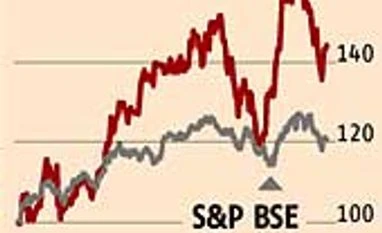Every time global automakers launch new products in India, the market highlights the risks they pose to Maruti Suzuki's volumes. Of late, similar concerns have been raised on the company but the difference is that there might be some merit in this argument this time, as global automakers are taking the fight right into the enemy's camp by coming out with products that are priced right. Maruti's sales in May suggest this story is playing out. The company's volumes are down 14 per cent year-on-year and 12 per cent month-on-month.
Over the last three years, sales of passenger cars have grown at a modest four per cent a year but the entry-level sedan segment has grown 26 per cent, as consumers have been upgrading from premium hatchbacks. Another segment that has beaten the slowdown is the sports utility vehicle segment, which has grown at 33 per cent in the same period. Maruti's five per cent volume growth in FY13 was driven largely by Dzire and Ertiga. These models accounted for over 20 per cent of the volumes and significantly higher proportion of revenues, given the higher average selling price (1.5x the average realisations) in FY13. JPMorgan says competition is eyeing Maruti's sweet spot and that the company will cede share in these high growth segments to competition.
The latest round of downgrades from analysts stem from the fact that new launches from rivals, such as Honda Amaze and Ford Ecosport, are expected to eat into Maruti's profitability. Honda received bookings for 22,000 units of Amaze, which accounts for 30 per cent of Dzire's annual volumes. Analysts fear these new launches will eat into Maruti's sales. What's worse, more products are expected to be launched in the price band of Rs 6-8 lakh, a high growth segment. Over the last couple of years, Maruti has also seen its product mix shift towards diesel vehicles, where realisations are higher. So far, a high share of diesel vehicles in overall volumes has been driving profitability. But with sales of diesel vehicles slowing, the risks to profitability have also increased. According to Motilal Oswal Securities, an adverse mix (lower diesel share) could impact Maruti Suzuki's margins. If diesel volumes decline five per cent, analysts expect a 30-40 basis point impact on operating margin and seven per cent impact on earnings. After the rupee's recent fall, fresh currency risks have also emerged for the company. Analysts say while the company has hedged 40 per cent of its Japanese yen exposure, the dollar exposure is unhedged. The stock has fallen 11 per cent over the past month.
Over the last three years, sales of passenger cars have grown at a modest four per cent a year but the entry-level sedan segment has grown 26 per cent, as consumers have been upgrading from premium hatchbacks. Another segment that has beaten the slowdown is the sports utility vehicle segment, which has grown at 33 per cent in the same period. Maruti's five per cent volume growth in FY13 was driven largely by Dzire and Ertiga. These models accounted for over 20 per cent of the volumes and significantly higher proportion of revenues, given the higher average selling price (1.5x the average realisations) in FY13. JPMorgan says competition is eyeing Maruti's sweet spot and that the company will cede share in these high growth segments to competition.
The latest round of downgrades from analysts stem from the fact that new launches from rivals, such as Honda Amaze and Ford Ecosport, are expected to eat into Maruti's profitability. Honda received bookings for 22,000 units of Amaze, which accounts for 30 per cent of Dzire's annual volumes. Analysts fear these new launches will eat into Maruti's sales. What's worse, more products are expected to be launched in the price band of Rs 6-8 lakh, a high growth segment. Over the last couple of years, Maruti has also seen its product mix shift towards diesel vehicles, where realisations are higher. So far, a high share of diesel vehicles in overall volumes has been driving profitability. But with sales of diesel vehicles slowing, the risks to profitability have also increased. According to Motilal Oswal Securities, an adverse mix (lower diesel share) could impact Maruti Suzuki's margins. If diesel volumes decline five per cent, analysts expect a 30-40 basis point impact on operating margin and seven per cent impact on earnings. After the rupee's recent fall, fresh currency risks have also emerged for the company. Analysts say while the company has hedged 40 per cent of its Japanese yen exposure, the dollar exposure is unhedged. The stock has fallen 11 per cent over the past month.
)